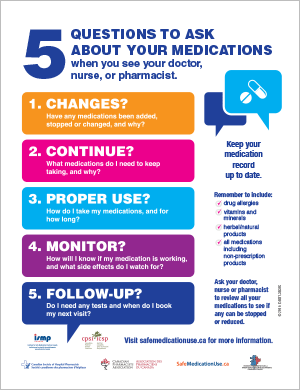Your Pharmacy Experience
Knowing what to expect when you visit your pharmacy will allow you to get the most out of your experience. You can expect:
- to be treated with respect;
- to have your personal health information protected;
- to be able to ask the pharmacist questions about your health and medications;
- to have the pharmacist speak with you privately, if you request, to discuss your health and medications; and
- to be able to discuss any concerns you have about your pharmacy experience with the pharmacist or pharmacist-in-charge.
People in the Pharmacy
Most pharmacies employ a combination of regulated and non-regulated staff, each with distinct roles and responsibilities. Each individual working in the pharmacy can be identified by their name tags.
Pharmacy professionals work to ensure that you receive safe and effective health care. In Newfoundland and Labrador, pharmacists, pharmacy technicians, pharmacy students, and interns must be registered with the NLPB.
Pharmacists
Pharmacists are regulated health professionals who have completed university-level education in how medications can be used to treat or prevent health conditions and how they act within the body and interact with each other.
Pharmacists are responsible for the aspects of pharmacy practice requiring clinical judgement such as assessing the appropriateness of medications, managing medication interactions and side effects, and educating patients on medications and their use.
Pharmacy Technicians
Pharmacy technicians are regulated health professionals who have completed recognized pharmacy technician education in the technical aspects of dispensing medications.
Pharmacy technicians may collect information from you about your health and medication history, prepare medications, check the accuracy of prepared medications, and teach you how to use drug delivery devices (e.g. inhaler aids) or health monitors (e.g. blood sugar or blood pressure monitors).
Both pharmacists and pharmacy technicians must:
- successfully complete national and provincial exams demonstrating competence in pharmacy practice and applicable pharmacy laws;
- meet professional development and continuing education requirements;
- follow federal and provincial pharmacy laws as well as standards of practice approved by the NLPB; and
- uphold the NLPB Code of Ethics.
Students and Interns
Students and interns may also be present in your pharmacy. These individuals are in the process of completing their education and training to become either a pharmacist or a pharmacy technician. They must practice under the supervision of a pharmacist or a pharmacy technician.
Pharmacy Assistants and Other Support Staff
Pharmacy assistants and other support staff in the pharmacy are not regulated by the NLPB, but still perform important duties within the pharmacy. These staff members work under the direct supervision of a pharmacist or pharmacy technician, and are often involved in the clerical aspects of dispensing and overall running of the pharmacy.
The Prescription-Filling Process
Each time you have a prescription filled, pharmacy team members will review your prescription and medication profile to ensure that:
- the information provided by the prescriber is accurate and complete;
- the medication, strength, and dosage instructions are appropriate for you and your health condition;
- you are not allergic to the medication; and
- there are no potential medication-related problems such as duplicate therapy or drug interactions.
In order to do this effectively, they may:
- collect information from you directly about your health and medications;
- review information within the Provincial Electronic Health Record;
- consult with other members of your health care team; or
- a combination of all of the above.
Once your prescription has been filled, a pharmacist will provide you with information about your medication to help you use it safely and effectively, including:
- the name of the medication
- what the medication is for
- the directions for proper use
- common side effects and how to manage them
- potential drug interactions
- what to expect from the medication and how soon to expect the medication to work
- what to do if you miss a dose
- how to store the medication
- any prescription refill information
- when to follow up with the pharmacist or your primary health care provider
Your Role
You have a role to play in ensuring you get the most benefit from your medications:
- Tell the pharmacist about any allergies or previous adverse reactions to medications.
- Tell the pharmacist about any non-prescription products you are taking; many over-the-counter products, including natural health products and herbal supplements, can interact with medications.
- Talk to your pharmacist about lifestyle and other non-drug measures you are taking to improve your health.
- Check your medication to ensure it looks as it should before you leave the pharmacy and ask your pharmacist if something looks different than expected.
What to Ask Your Pharmacist
The Institute for Safe Medication Practices Canada, the Canadian Patient Safety Institute, the Canadian Pharmacists Association and the Canadian Society for Hospital Pharmacists have collaborated to develop a set of 5 questions to help patients and caregivers start a conversation about medications to improve communications with their health care provider.

You can also download a copy of this list from the ISMP website.
If You Have a Concern
Try talking to your pharmacist or the pharmacy manager about your concerns with the pharmacy care you received. Sometimes problems occur because there has been a misunderstanding. Having a discussion may resolve your questions and concerns.
If you feel this approach was not effective, see our Complaints & Discipline Overview page for additional guidance.
